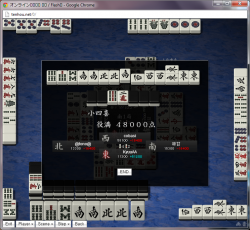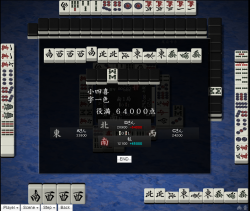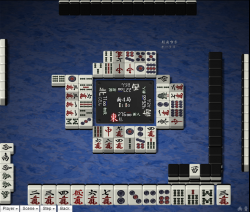Yakuman: Difference between revisions
mNo edit summary |
mNo edit summary |
||
| Line 5: | Line 5: | ||
Yakuman are worth 8000 base points. For a non-dealer, this would equal 32000 points for ron, or 8000/16000 points from tsumo. | Yakuman are worth 8000 base points. For a non-dealer, this would equal 32000 points for ron, or 8000/16000 points from tsumo. | ||
A [[kazoe yakuman]] is scored when a hand reaches 13 or more [[han]]. Otherwise, in standard rules, a hand cannot score both yakuman and regular yaku at the same time. In other words, if a hand contains a yakuman | A [[kazoe yakuman]] is scored when a hand reaches 13 or more [[han]]. Otherwise, in standard rules, a hand cannot score both yakuman and regular yaku at the same time. In other words, if a hand contains a non-kazoe yakuman, it effectively has 0 han. | ||
In [[aotenjou]], yakuman ''can'' score with other yaku. Under those rules, each yakuman is treated as a regular yaku worth 13 han. | In [[aotenjou]], yakuman ''can'' score with other yaku. Under those rules, each yakuman is treated as a regular yaku worth 13 han. | ||
==Difficulty== | ==Difficulty== | ||
Yakuman are rare and | Yakuman are rare and difficult. Most yakuman have restrictions that make them difficult, such as [[ryuuiisou]] only allowing 6 of 34 tile types, or [[shousuushii]] requiring 3 [[wind]] triplets and a pair of the fourth. Others are achieved in specific conditions, such as [[tenhou and chiihou]] being won on the first draw. | ||
Among the yakuman, three in particular are considered to be among the easiest to attain: [[suuankou]], [[daisangen]], and [[kokushi musou]]. Collectively, these three yakuman are known as '''yakuman gosanke''' {{kana|役満御三家}}, or "the three big families of yakuman". | Among the yakuman, three in particular are considered to be among the easiest to attain: [[suuankou]], [[daisangen]], and [[kokushi musou]]. Collectively, these three yakuman are known as '''yakuman gosanke''' {{kana|役満御三家}}, or "the three big families of yakuman". | ||
| Line 19: | Line 19: | ||
The more games the play, the higher the chance you'll score a yakuman eventually. Naturally, luck also players a role. When a yakuman becomes viable to aim for, a player should recognize the chance and seize it. | The more games the play, the higher the chance you'll score a yakuman eventually. Naturally, luck also players a role. When a yakuman becomes viable to aim for, a player should recognize the chance and seize it. | ||
The chance for a yakuman is not constant; it decreases as opponents grow in skill level. Higher skill opponents tend to have better [[tile efficiency]], so they can win normal hands faster, before a yakuman gets to form. | The chance for a yakuman is not constant; it decreases as opponents grow in skill level. There are multiple possible reasons. Higher skill opponents tend to have better [[tile efficiency]], so they can win normal hands faster, before a yakuman gets to form. They are more likely to defend once a yakuman threat is present. Also, the amount of "yakuman chasing" likely decreases at higher levels of skill. Example statistics: | ||
*[[Tenhou.net]], tokujou room, month of Mar. 2024: ~1/930.6 of winning hands are yakuman | *[[Tenhou.net]], tokujou room, month of Mar. 2024: ~1/930.6 of winning hands are yakuman | ||
*Tenhou.net, houou room, month of Mar. 2024: ~1/1228 of winning hands are yakuman | *Tenhou.net, houou room, month of Mar. 2024: ~1/1228 of winning hands are yakuman | ||
| Line 36: | Line 36: | ||
== Avoiding yakuman == | == Avoiding yakuman == | ||
The last thing any player should do is play into a yakuman hand. Alas, such plays do happen, even to the best of players. Of course, this is where [[defense]] is relevant, especially when a yakuman is an apparent threat. Then again, if a hand | The last thing any player should do is play into a yakuman hand. Alas, such plays do happen, even to the best of players. Of course, this is where [[defense]] is relevant, especially when a yakuman is an apparent threat. Then again, if a yakuman hand happens to be closed, it's difficult to tell that it is a yakuman. | ||
==External links== | ==External links== | ||
Revision as of 03:59, 24 March 2024

Yakuman 「役満」 are a special class of yaku (hand patterns) whose point value is set to the maximum. These hands are considered rare and difficult. Traditionally, a yakuman is the most that any one hand can reach. However, some rule variations allow multiple yakuman to be combined.
Definition
Yakuman are worth 8000 base points. For a non-dealer, this would equal 32000 points for ron, or 8000/16000 points from tsumo.
A kazoe yakuman is scored when a hand reaches 13 or more han. Otherwise, in standard rules, a hand cannot score both yakuman and regular yaku at the same time. In other words, if a hand contains a non-kazoe yakuman, it effectively has 0 han.
In aotenjou, yakuman can score with other yaku. Under those rules, each yakuman is treated as a regular yaku worth 13 han.
Difficulty
Yakuman are rare and difficult. Most yakuman have restrictions that make them difficult, such as ryuuiisou only allowing 6 of 34 tile types, or shousuushii requiring 3 wind triplets and a pair of the fourth. Others are achieved in specific conditions, such as tenhou and chiihou being won on the first draw.
Among the yakuman, three in particular are considered to be among the easiest to attain: suuankou, daisangen, and kokushi musou. Collectively, these three yakuman are known as yakuman gosanke 「役満御三家」, or "the three big families of yakuman".
Chance
While elusive, yakuman are not impossible. Players with a chance for a yakuman can benefit from going for said yakuman. Like any other decision, this choice depends on game state, such as the current point standings, number of tile draws left, and the current hand.
The more games the play, the higher the chance you'll score a yakuman eventually. Naturally, luck also players a role. When a yakuman becomes viable to aim for, a player should recognize the chance and seize it.
The chance for a yakuman is not constant; it decreases as opponents grow in skill level. There are multiple possible reasons. Higher skill opponents tend to have better tile efficiency, so they can win normal hands faster, before a yakuman gets to form. They are more likely to defend once a yakuman threat is present. Also, the amount of "yakuman chasing" likely decreases at higher levels of skill. Example statistics:
- Tenhou.net, tokujou room, month of Mar. 2024: ~1/930.6 of winning hands are yakuman
- Tenhou.net, houou room, month of Mar. 2024: ~1/1228 of winning hands are yakuman
Winning with yakuman
A yakuman ron can put an opposing player in negative points, potentially ending the game. In any case, a yakuman will almost always put you in a huge lead. Still, you must not be complacent, as you still have a chance to drop down.
Multiple yakuman


Some yakuman may combine if their tile patterns allow them to do so. The most common combinations involve tsuuiisou along with shousuushii and daisangen. Tenhou and chiihou can combine with any yakuman (except suukantsu and kazoe), though this event is exceptionally rare. Kazoe yakuman may not combine with any other yakuman, since yakuman cannot be scored with regular yaku.
In some rulesets, a hand can only score one yakuman, even if a hand contains multiple. Others allow the yakuman to stack, e.g. a double yakuman, worth 64000 points, for suuankou + daisangen. Sometimes, special patterns like suuankou tanki and daisuushii are worth double yakuman on their own.
Avoiding yakuman
The last thing any player should do is play into a yakuman hand. Alas, such plays do happen, even to the best of players. Of course, this is where defense is relevant, especially when a yakuman is an apparent threat. Then again, if a yakuman hand happens to be closed, it's difficult to tell that it is a yakuman.
External links
- Yakuman in Japanese Wikipedia
- Yaku frequency among Tenhou.net players (Japanese)
- Lists all the yaku occurrences in Tenhou.net by percentages and by ranked lobby.
- Lists any yakuman scored within the regular L0000 lobby, within the current month.
| |||||||||||||||||||||||||||||||
